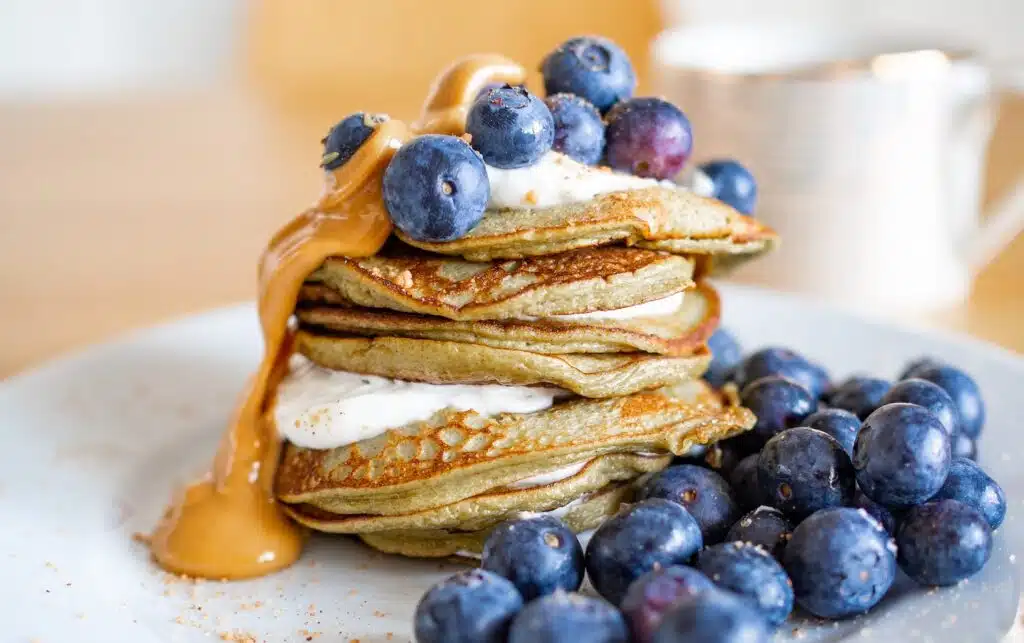Key Takeaways
- Late night snacking can negatively impact your body’s metabolism, leading to weight gain.
- Energy is usually burned more effectively in the earlier parts of the day, so when you eat before sleeping, you may increase the likelihood of weight gain.
- Eating late at night or grazing on late-night snacks has the potential to alter your energy levels and metabolism
- Eating at least three hours before bed may help with getting a full night of sleep (over seven hours) and decreases the risk of insulin resistance.
Eating before bed is extremely common. You might eat a late-night dinner. You might snack in bed. And, some nights, you might even wake up from your slumber to alleviate hunger pangs.
Sound familiar?
Well, these may be eating habits and patterns worth taking another look at. They can put you at greater risk of eating beyond your caloric needs each day, which increases the likelihood of weight gain and metabolic concerns.
Research suggests that having a healthy body weight may add years to your life and improve your mobility.
Here’s what you should know about the role your metabolism plays in your weight loss goals and what to do if you’re a late-night snacker.
Spoiler: turns out changing your routine—even a little bit—could make a big difference in your long-term goals.
Understanding Your Metabolism’s Cycles During the Day
Your body has a circadian rhythm, also known as the “biological clock.”
The circadian rhythm is the body’s natural 24-hour cycle that regulates many physiological processes. This internal clock is influenced by environmental cues such as light and darkness, which help to synchronize bodily functions with the day-night cycle.
Metabolism, the process by which the body converts food into energy, is also regulated by the circadian rhythm.
During the day, when most people are more active, the body does a better job at digesting and metabolizing food. Studies have shown the body burns more calories at rest and after eating during the earlier part of the day compared to at night.
Late-night eating can disrupt your circadian rhythm, leading to weight gain, according to research.
The research also suggests that eating later in the day, especially at night, is linked to weight gain. This misalignment between the body’s internal clock and food intake may also contribute to insulin resistance and other metabolic disorders.
4 Ways Late-Night Eating Affects Your Body
Nighttime is coming up quickly. Do you suddenly want something to eat?
For many people, it’s common to grab a snack before they head to bed. But that’s often a psychological habit more so than an actual need for food. And, as you just learned, that habit isn’t always great for you.
Here are a few other reasons why it’s key to avoid eating late at night.
1. Increases Hunger Levels
Oddly, one of the effects of eating later may be increased hunger levels. That’s because eating late can disrupt the hormones that help regulate satiety and hunger.
Eating too close to bedtime can mean you’ll be searching for more food and may end up grabbing additional snacks.
2. Burn Fewer Calories
Weight gain and loss is, at the core, a math problem. You need to take in fewer calories than you expend during the day.
Weight gain may be more likely with nighttime eating. Why? You’re adding in extra calories that you probably don’t need to use for energy.
Plus, your body’s metabolism is slower at night. A slow metabolism may contribute to weight gain if you’re eating a large meal before bed and exceeding your recommended caloric intake.
3. Promotes Fat Storage in Your Body
One Harvard study that included a small, randomized control group of 16 overweight or obese participants found that eating later in the day increased hunger, reduced the number of calories burned, and promoted body fat storage within the body.
4. Disrupts Your Body’s Circadian Rhythm
One additional reason to avoid eating late at night is because it can affect your circadian rhythm and sleep pattern.
According to one study, eating on a schedule that isn’t in line with your circadian rhythm (for example, eating late at night rather than during waking hours) may increase your risk of developing metabolic disorders.
Those four issues, over time, could be linked to an increase in weight.
How can you prevent that? Eat a high-fiber and high-protein breakfast. Science shows that it helps sustain energy levels throughout the day and encourages satiation while reducing snacking later in the day.

What Time Should You Stop Eating at Night To Lose Weight?
There is no exact answer to when you should stop eating because everyone lives in different places with varied light and darkness.
The general consensus is to stop eating three hours before you go to bed. But exactly what time you’ll stop eating will vary based on your current nightly routine.
A 5 p.m, dinner can work for someone who hits the sack by 8 p.m. But if you don’t go to bed until 10 p.m., a later dinner—say around 7—might work.
Or, you could have dinner earlier followed by a snack three hours before bedtime as long as you don’t end up eating more calories than you need for the day.
If you do find yourself hungry at night, by all means, eat something. Go for a light but filling option, like a cup of air-popped popcorn, which has only 62 calories.
FAQ
What do I do if I often wake up hungry?
If you wake up and eat in the middle of the night, consider having a slightly larger breakfast and lunch, so you’re not as hungry when you come to dinner or bedtime.
How late should you eat your last meal of the day if you are intermittently fasting?
People who use intermittent fasting (and those worried about weight gain from late-night food cravings) should consider setting up their eating hours to end roughly three hours before bed.
The Bottom Line
When all is said and done, eating late at night or grazing on late-night snacks has the potential to alter your energy levels and metabolism, including impacting insulin and your blood sugars.
But exactly why and how this happens isn’t well understood. More studies need to be done. Some evidence on this topic is conflicting.
If you would like to try eating earlier, stick to eating at least three hours before bed and you may have a better chance of reaching your health and weight goals.







